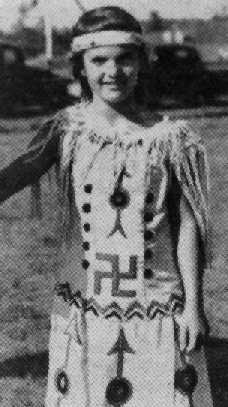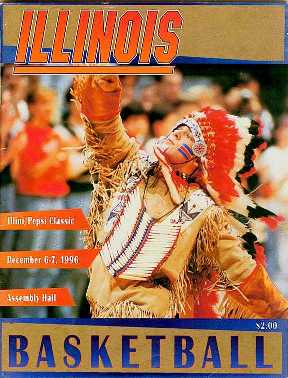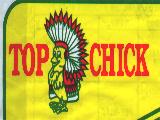 Another Stereotype of the Month entry:
Another Stereotype of the Month entry:
 Another Stereotype of the Month entry:
Another Stereotype of the Month entry:
P.C. vs. the Indian Princesses
Michelle Malkin
September 12, 2003
Political correctness is breaking the hearts of thousands of little girls — and their daddies are having a hard time explaining why multicultural hypersensitivity is more important than their daughters' innocent fun.
Beginning this month, the YMCA's Indian Princesses organization will cease to exist. The group was inspired by Harold Keltner, a St. Louis YMCA director, who teamed up with a Canadian Ojibway Indian in 1926 to create a unique outdoors club for dads and children. Joe Friday, Keltner's good friend, fishing partner and hunting guide, spoke to YMCA members in Missouri about American Indian culture and the importance of the father's character-shaping role.
Invigorated by his discussions with Friday, Keltner created the "Y-Guides" programs incorporating Native American lore, traditions, ceremonies and regalia. Keltner organized the groups into "tribes" and "nations" led by "chiefs." The chiefs donned American Indian-style headdresses. Children learned Indian phrases. The Princesses program was added in the 1950s. Over the past 70 years, generations of Y-Guides dads have spearheaded historical research projects, camping trips and visits to Indian reservations. "The intention of the Y-Indian Guide programs has always been to honor American Indians," Arnie Collins, spokesman for the YMCA, recently noted.
More than a quarter-million fathers and children have strengthened their family bonds through these non-profit cultural programs. A few years ago, however, a tiny faction of militants from the radical American Indian Movement (AIM) targeted the YMCA's Indian Guides/Princesses as "racist." Only Indians should be allowed to dress as Indians and replicate Indian traditions, AIM argued. "What we were saying is, 'we understand where you're coming from, we understand that you want to honor the Indian, but you're not doing that,'" complained David Narcomey, North Florida director of AIM. "You're causing psychological damage to our children."
Peggy Larney of Dallas, a Choctaw Indian, protested the use of headdresses and feathers. "When other people that aren't Indian do it, they're not being authentic to it. It's just not right," she told the local press. Vernon Bellecourte, another AIM spokesman, called the Indian Guides program a "cheap Hollywood" version of American Indian culture. "They sit around in a circle with their chicken feathers, they have their little greetings and they call their groups various tribes," he griped. "It totally distorts our culture. They can only relate to this very superficial, stereotypical image of who they think we are."
But it's the critics who are doing the stereotyping. One of my readers, parent David Cull, described to me his enriching Indian Guides/Princesses experience with his 6-year-old daughter, Michelle: "Our tribe, the Karankawas, meets once a month at a tribe member's home where we have activities and crafts for the girls (our princesses) and have a story after which we discuss the morals of that story. We go camping several times a year. . . . When our group formed, we researched the Karankawas. They were a tribe that lived along the Texas coast. They were very tall and upon occasion were cannibals. The fathers in our tribe have always been respectful to the Indian culture. In fact, two of the 10 braves have Indian blood in them."
Another parent in south Florida notes that his group has convened overnight events on the Big Cypress Reservation, attended annual Pow-Wows held by the Miccosukee tribe, and shared meals, dances and story-telling sessions with the Seminoles. "I am grateful to have had the chance to expose my children to these things," he said, "and I wonder, if it had not been for this program, what their understanding of Native Americans might have been based on."
Alas, the national YMCA ignored the pleas of parents and children and instead succumbed to pressure from perpetually offended AIM protesters — some of whom even threatened to sue a YMCA chapter to prevent them from using Indian names and themes. In 2001, the organization voted to eliminate the Indian monikers from the Guides/Princesses programs. The tribal themes will be phased out completely beginning this fall. The groups will now be known as "Adventure" Guides.
This classic example of P.C. bowdlerism is not the end of the world, to be sure. But the death of the Indian Princesses illustrates the fraudulent nature of zealous multiculturalism, which preaches unequivocal inclusiveness while enforcing selfish insularity.



Rob's comment
Malkin didn't address Bellecourt's criticism. Her reply is a non sequitur. So some YMCA "tribes" tell stories, go camping, even research real tribes. She hasn't denied that they also engage in stereotypical practices.
Malkin even lists the stereotypes for us. Chiefs...headdresses...feathers (which Indians often consider sacred). What about the tribes that didn't have chiefs, or had chiefs who didn't wear feather headdresses? How does the YMCA-Indian Guides honor these tribes?
Camping? Some Indians lived in small towns or even big cities, not the outdoors. Some lived in the desert or the arctic, not in forests. Are the YMCA's "tribes" willing to replicate the Indians' sometimes harsh living conditions? Unlikely.
Unless each "tribe" has a different set of beliefs and practices, they're stereotyping Indians by homogenizing them. They're acting as if all Indians were the same.
The very name of the program, "Princesses," is perhaps the worst stereotype in the program. Indian girls, even the daughters of chiefs, weren't princesses. Anyone concerned about honoring Indians, especially Indian women, would change the program's name immediately.
Is Malkin willing to do that? Unlikely.
No, I think Bellecourt summarized the problem accurately. The YMCA-Indian Guides and Malkin "can only relate to this very superficial, stereotypical image of who they think we are." Exactly.
It'll be interesting to see what happens to all the research project and visits to reservations once the YMCA changes the program's name. If all these "tribes" are sincere about honoring Indians, they'll continue their activities even if they can't play dress-up. How much do you want to bet the "Adventure Guides" program won't honor Indians in any way?
As for Malkin's view of multiculturalism, I'm not sure it preaches "unequivocal inclusiveness." I am pretty sure it stresses cultural authenticity and accuracy. That's a standard the YMCA-Indian Guides fails to meet.
Related links
YMCA-Indian Guides
Tipis, feather bonnets, and other Native American stereotypes
|
. . . |

|
All material © copyright its original owners, except where noted.
Original text and pictures © copyright 2007 by Robert Schmidt.
Copyrighted material is posted under the Fair Use provision of the Copyright Act,
which allows copying for nonprofit educational uses including criticism and commentary.
Comments sent to the publisher become the property of Blue Corn Comics
and may be used in other postings without permission.